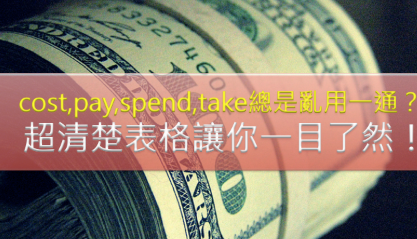1. cost 的本意为「价值」,故仅限用于「主词」为「物」时,当然也仅限用于「金钱」上。
句型用法:
物品 + cost(s) + 人 + $.
It + cost(s) + 人 + $ + to + 原形动词.
*cost 的过去式与过去分词皆为 cost
The LV bag cost me NT$80,000.
It cost him NT$80,000 to buy the LV bag.
(LV包包花了他 80,000 台币。)

2. spend 用于花费「时间、金钱」,主词只能是「人」,其后若有第二个动词,则只能用「动名词」形式。
句型用法:
人 + spend + 时间/ $ + V-ing.
I spent 10 minutes waiting for the bus.(我花了十分钟等公车。)
I spent NT$15 taking the bus. (我花了 15 块钱搭公车。)
人 + spend + $ + on + 物品.
He spent $100 on the LB bag.(他花了 100 块钱买 Lu Beintan 路边摊包包。)
*spend 的过去式与过去分词皆为 spent
3. take 用于花费「时间」
句型用法:
It + takes/took + 人 + 时间 + to + 原形动词.
It took Eric 10 hours to grade all the assignments.(Eric 花了十小时改作业。)
V-ing (动名词当主词) + takes/took + 人 + 时间.
Writing this Chinese sentence took Eric 20 minutes.(写中文句子花了 Eric 20 分钟。)
*take 的过去式与过去分词分别为 took 及 taken
4. pay 的本意为「付钱」,故只能用于「金钱」上,当然「主词」也只能是「人」。
句型用法:
人 + pay + $ + for + 物品. ->(人)付 $ 买(物)
I paid a lot of money for that iPhone99S.(我花了很多钱买 iPhone99S。)
*pay 的过去式与过去分词皆为 paid







